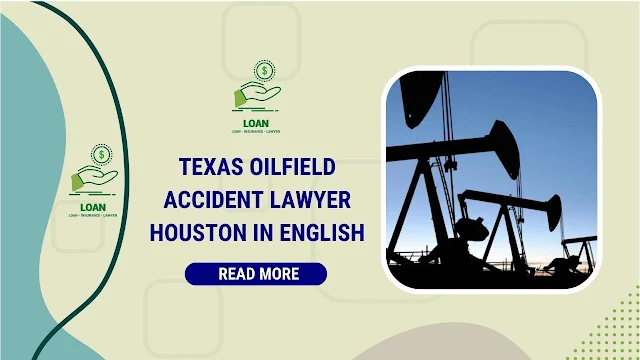Texas is a major player in the oil and gas industry. From natural gas products to refineries, the oil and gas industry wouldn't be what it is today without Texas. While the industry has brought wealth and prosperity to some, it has come at a serious cost to others. Oilfield accidents are very common in Texas and can occur during and after all stages of the extraction process, including drilling sites, pipelines, transportation, refineries and other related areas. All workers have the right to a reasonably safe workplace, and that includes oil and gas workers. Energy industry employers can be held liable when they recklessly endanger the lives of their employees.
 |
| texas oilfield accident lawyer houston in english |
Table of Contents
Award Winning Injury Attorneys Oilfield Accident Attorney
The
US The Bureau of Labor Statistics estimates an average of 120 oil and
gas fatalities each year, with thousands more workers suffering serious
injuries. Given the dangerous nature of the work, these injuries are
often more serious than those in white-collar workplaces. Oilfield
accidents can often involve workers who are exposed to electrical
currents, hazardous substances or chemicals, fires, explosions, toxic
material leaks, and line blowouts, among many other possible causes.
Each year in Texas alone, the Texas Railroad Commission assesses
thousands of violations against the oil and gas industry for workplace
safety failures, often involving oilfield vehicles, equipment,
pipelines, storage and more.
Causes of Oilfield Accidents
Due
to the sensitive nature of oil extraction and production, a variety of
hazards can result in a catastrophic oilfield accident. Workers often
work in tight, cramped spaces using heavy machinery, complex and
sensitive equipment, and chemicals. Given that these hazards are
inherent in oilfield work, preventable accidents often result in
life-changing injuries and fatalities. Workers suffer from inadequate
leadership and supervision by employers in the following ways:
Related Posts
Equipment failure is a leading cause of serious injury and
death. Oilfields are intricately constructed to support oil refining
and production. Every aspect needs to be regularly inspected and
serviced to keep workers safe. This applies to heavy equipment and
machinery that workers must come in contact with while performing their
daily job duties. Oil companies are notorious for safety issues, because
the cost of shutting down for maintenance is less valuable to them than
the cost of human life.
Structural failure is similar to the
failure of equipment such as beams, pipes, stairwells, and any surface
that employees interact with that requires regular inspection and
maintenance. Structural hazards put workers at risk of injury when there
are loose pipes or cracks/leaks that allow chemicals to escape,
collapsed beams, faulty stairs and railings, and more. Because workers
are placed in confined spaces with heavy objects, it is important that
the facility is structurally sound.
Inadequate training can be
responsible for human error on an oilfield worksite. Workers are only as
safe as they are trained. This can be said not only in terms of safety
training, but also for job-specific training, chemicals used and their
hazards, and emergency training. Workers who can spot problems when
working with machines, tools and chemicals have a chance to prevent
serious accidents – but they can only do so with the necessary training
tools. Training must be accessible, mandatory, and provided in languages
that employees understand—all before they take on any job duties.
Additionally, the importance of safety training should be emphasized
considering the amount of risk associated with both job tasks and
facility layouts that may be difficult to evacuate during an emergency.
Common Injuries
Ignoring
industrial standards contributes to preventable accidents. Oil
companies are legally required to operate under federal and state safety
standards, including compliance with regulations outlined by the
Occupational Health and Safety Administration (OSHA). Compliance with
these regulations can be time-consuming and costly, taking time and
manpower away from profitable production schedules. Oilfield owners and
operators must regularly shut down workplaces for inspection and
maintenance and upgrade facilities that do not meet safety standards.
Lack
of signage and personal protective equipment leaves workers vulnerable
to workplace hazards. Oilfields should have safety signs, including
precautions and regulations, displayed in high-visibility areas and
posted in a language workers understand. Additionally, employers must
provide them with personal protective equipment for an additional
barrier between themselves and their work. Personal protective equipment
such as safety goggles and hardhats can dramatically reduce serious
injuries.
Common Injuries
Given
the common causes of oilfield accidents, the injuries are usually
severe and the physical, emotional and financial effects are permanent.
Oilfield accident injuries can leave workers disfigured and unable to
work. Common injuries in oilfield accidents include but are not limited
to:
- Amputation
- Broken bones or fractures
- Deep cuts and lacerations
- Traumatic brain injuries
- Paralysis
- Spinal cord injuries
div class="showH" itemscope="" itemtype="https://schema.org/FAQPage">
How Can a Texas Oilfield Accident Attorney Help?
Texas is one of only two states that does not require employers to subscribe to workers' compensation. For these and other reasons, when a worker is injured they may be forced to pay their own medical expenses out of pocket. Texas has the most oilfield accident deaths in the country; And, hiring an oilfield accident attorney who knows the applicable state and federal laws is essential. If you or someone you know has been injured in an oilfield accident, contact us to learn your rights.
![What is Insurance | Insurance Meaning and Types | Why insurance is important [2021]](https://blogger.googleusercontent.com/img/b/R29vZ2xl/AVvXsEg4o720bpBs1yJH_HoO0NQSuc1WBVkaG1ttedsfJoDGJSm6DbDzsn4aWR25b6KthW3OcO-1JC3NTSbcmV6Aa6VBQrbIrJbIfZmR7nxqa4DsjLXv6eYUxd0CxWd2kPDjd6YeRA9JLbzlvSE/w320-h320-p-k-no-nu/What+is+Insurance++Insurance+Meaning+and+Types++Why+insurance+is+important+%255B2021%255D.jpg)

![[ Hindi] Car Loan - Compare Best Interest Rate Online](https://blogger.googleusercontent.com/img/b/R29vZ2xl/AVvXsEj37scwMuKhNz81RBSSdEqwVHA1X2X3jGSVRhTTuVaXqhulqVwM5K22Yl9MCTT5mOUdirlBAMXim-idCbQ9gA_F8yIKJpuP40EPX2_c4EyTpy4tCOhoJxsYZbQe1BtXuwiaB-DLWVQSsBIH/w320-h320-p-k-no-nu/car+images.png)

